Freedom Team Interview: Karolin Pscheidt

Thank you, Karolin, for your contributions during your internship at FNF
Please share a few words about yourself?
My name is Karolin Pscheidt from Germany. I am a social worker (B.A.), coming from the working field of Migration, Integration and Asylum. I am studying ''Management of Intercultural Issues and Development Management'' (M.A.) but will graduate next summer. Before that I got the chance to work for FNF as an intern in Sofia for 4 months. The foundation work and human rights work allow me to combine my two studies perfectly.
What have been your first impressions so far from your internship in FNF?
In the Regional Office FNF East and Southeast Europe, as well as in the Project Office Southeast Europe, I was received very warmly. I was given the feeling of belonging from the very beginning. I am allowed to support the team, but at the same time, I am also allowed to bring in my own opinion. The whole office is working hard on many different, important topics, but the joy of the work is not neglected. One is inspired by many innovative ways of working and goals as well as by the cooperation with many experts from different areas.
What is the most interesting and challenging about your internship in FNF?
Due to my studies, it is especially interesting for me to work in an international environment on a daily basis, be it internally with colleagues or externally with partner organizations in Bulgaria or North Macedonia so far. To experience the enrichment and challenges that this situation brings with it is incredibly valuable. It is also a unique opportunity for me to learn more about life, the people and the political situation in East and Southeast Europe. This changes not only my view of the Balkans but also of Germany and Europe in general.
Given your background so far, what and how would you contribute to the mission of FNF and the pursuit of Freedom?
Working at FNF makes it clear to me how important political education is, to become active oneself and to get involved within its framework and possibilities. As well as the freedom to do things differently than they have been done so far and above all to network. Not only in one's field of study, but beyond it. An example of this is would be to combine activism with art or to exchange ideas with people who have already developed best practices elsewhere.
Why is the promotion of Freedom important to you?
By working with refugees, one quickly becomes aware of the value of personal and social freedom. On the one hand, it is important to defend democracy, on the other hand, it is important to develop it further. Equal rights, racism and inclusion, to name just a few, are areas in which there is clearly a need to catch up - in Germany, Europe and the world. Freedom enables us further to make our own decisions, which can then lead to positive change more easily and more effectively.
What does the “F” of FNF mean to you?
For me, the "F" stands for forward.
It's about shaping the future in an inclusive and active way by looking ahead. Standstill or the glorification of the past are no options here. Albert Einstein said for example: ''We can't solve problems by using the same kind of thinking we used when we created them. '' But that does not exclude learning from the past, incorporating experiences and using achievements. On the contrary, it's about change in a humane and sustainable way. It, therefore, requires innovation, exchange and optimism.
What is your Freedom quote?
''I’ll tell you what Freedom is to me. No fear.'' – Nina Simone